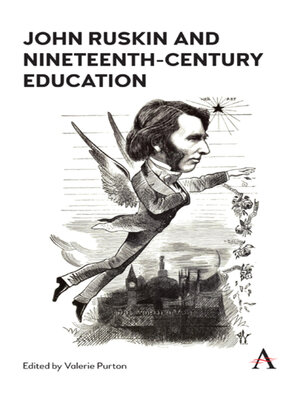
Sign up to save your library
With an OverDrive account, you can save your favorite libraries for at-a-glance information about availability. Find out more about OverDrive accounts.
Find this title in Libby, the library reading app by OverDrive.



Search for a digital library with this title
Title found at these libraries:
| Library Name | Distance |
|---|---|
| Loading... |
An art historian, cultural critic and political theorist, John Ruskin was, above all, a great educator. The inspiration behind William Morris, Leo Tolstoy, Marcel Proust and Mahatma Gandhi, Ruskin's influence can be felt increasingly in every sphere education today. John Ruskin and Nineteenth-Century Education brings together top international Ruskin scholars, exploring Ruskin's many-faceted writings, pointing to some of the key educational issues raised by his work, and concluding with a powerful rereading of his ecological writing and apocalyptic vision of the earth's future. In anticipation of the bicentennial of Ruskin's birth in 2019, this volume makes a fresh and significant contribution to Victorian studies in the twenty-first century. It is dedicated to Dinah Birch, a much-loved Victorian specialist and authority on John Ruskin.
|John Ruskin, whose bicentenary will be celebrated world-wide in 2019, was not only an art historian, cultural critic and political theorist but, above all, a great educator. He was the inspiration behind such influential figures as William Morris, Leo Tolstoy, Marcel Proust and Mahatma Gandhi and his influence can be felt increasingly in every sphere of education today, for example, in debates about the importance of creativity, about grammar schools and social mobility, about Further Education, the crucial social role of libraries, environmental issues, the role of crafts as well as academic learning, the importance of fantasy literature, and the education of women. The current collection brings together ten top international Ruskin scholars to explore what he actually said about education in his many-faceted writings, and points to some of the key educational issues raised by his work. [NP] The volume is divided into three sections, covering the three major areas of Ruskin's concerns, namely social reform, the arts and religion. Their titles suggest his dynamic effect in all three areas: A) Changing Society; B) Libraries and the Arts; C) Christianity and Apocalypse. Ruskin's vision of education as both dividually and socially transformative is explored by Sara Atwood in Chapter 1. Among much else, he stresses the value of simplicity, one of many ideas he shared with his great admirer, Leo Tolstoy, a relationship explored by Stuart Eagles in Chapter 2. Ruskin believes too in the social and educational importance of dress, an idea developed by Rachel Dickinson in Chapter 3. Jan Marsh, in Chapter 4, examines Ruskin's contradictory stance on female education. Though he was a great believer in the 'separate spheres', he also championed wider learning opportunities for girls. The dissemination of education, through libraries and through the arts, is one of Ruskin's abiding concerns. Continuing his argument about the power of simplicity over artifice, he talks in the inaugural address of 'the virtues of Christianity [being] best practised, and its doctrines best attested, by a handful of mountain shepherds without art, without literature, almost without language.' In the history of Switzerland, he says, 'The shepherd's staff prevailed over the soldier's spear.' In Chapter 5 Emma Sdegno explores Ruskin's Shepherds' Library, his notion of book dissemination to such people, while in Chapter 6 Stephen Wildman examines another of his educational experiments, the use of photography to enable ordinary people to encounter the Old Masters and to 'see clearly'. Paul Jackson in Chapter 7 breaks new ground in revealing Ruskin's response to music, an art to which he responded deeply as a sensuous experience, while arguing that it could also act as an agent of moral improvement. In Chapter 8 Edward James examines Ruskin's only explicit foray into...







